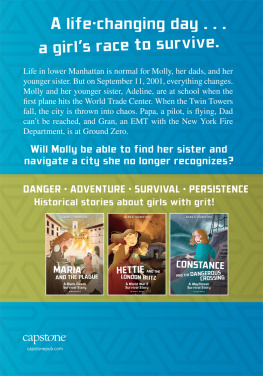For Beginners LLC
30 Main Street, Suite 303
Danbury, CT 06810 USA
www.forbeginnersbooks.com
Copyright 2019 Micah J. Fleck
Illustrations copyright 2019 by Luca F. Carey
This book is sold subject to the condition that it shall not, by way of trade or otherwise, be lent, re-sold, hired out, or otherwise circulated without the publisher's prior consent in any form of binding or cover other than that in which it is published and without a similar condition being imposed on the subsequent purchaser.
All rights reserved. No part of this publication may be reproduced, stored in a retrieval system, or transmitted in any form or by any means, electronic, mechanical, photocopying, recording, or otherwise, without prior permission of the publisher.
A For Beginners Documentary Comic Book
Copyright 2019
Cataloging-in-Publication information is available from the Library of Congress.
ISBN # 978-1-939994-76-9 Trade
Manufactured in the United States of America
Typography by Dana Hayward
For Beginners and Beginners Documentary Comic Books are published by
For Beginners LLC.
First Edition
10 9 8 7 6 5 4 3 2 1
www.redwheelweiser.com
www.redwheelweiser.com/newsletter
FOREWORD
by John L. Jackson, Jr.
Anthropology shouldn't just be for anthropologists. Not even close.
At my most generous, I might characterize this seemingly quirky little discipline as a particularly empathic way of living life in a diverse world, a way of being that places a premium on learning all we can through close attention to what we observe people doing and saying, both now and in the past: what they eat and where they live, how they bury their dead and protect their families, who they love and who they hate. This is all undeniably juicy fodder for what Muriel Dimen in the 1970s called the anthropological imagination. But how should we imagine anthropology?
I like to tell my students that anthropology is both the most hubris-filled and humble academic discipline on the planet.
Its hubris comes from the fact that card-carrying anthropologists are situated within and across the humanities, the social sciences and the natural sciences, those three major buckets distinguishing and comprising all academic fields in higher education. No other discipline can boast that kind of wide-ranging reachnot philosophy, not psychology, not even physics.
Anthropologists try to determine precisely what makes human beings humans. What makes us similar toand different fromany other sentient creature? One answer to that question is simple: every single thing you can think of, which is why self-proclaimed anthropologists consider anything fair game for study, from primate mating rituals in the Amazon to scientific research practices among those working on the Higgs Boson in Geneva. Wherever and whenever you find humans doing and saying things, you have discovered data ripe for anthropological investigation. That realization also helps to explain what I might describe as anthropology's humility.
At its core, anthropologists claim that any human being, living or dead, is a powerful ambassador for the social universe they inhabit. They can be a princess or a pauper, an opera singer or a hip-hop emcee. If we really pay attention to what people tell us about the worlds they come from, either through texts found in contemporary archives or as organic remains left in the ground from thousands of years ago, we will learn something valuable about the human condition. In some ways, the more seemingly trivial the subject, the more profoundly its thoughtful analysis can help us rethink fundamental questions about human life.
We used to debate the difference between nature and nurture in determining human potential. Is biology destiny, or does our social environment play a deciding role in shaping people's lives and life chances? Anthropologists have always been in the middle of such academic disputes, and they continue to operate at the intersection of biology and culture, some making a case for the biological proclivities we share with other species, others arguing that most popular understandings of biology are just cultural ideas dressed up to look and feel like genetic mandates. The history of anthropology as a so-called race science is all about such machinations. This book helps to make sense of those debates, both by unpacking the four traditional subfields of American anthropology and by showing how normative assumptions about humanity have changed in fascinating and fundamental ways over time.
It seems particularly appropriate to me that this short primer on the field starts with a metaphor straight out of science fiction: aliens landing on earth from another galaxy. We tend to think of anthropologists as people who traffic in the past, in bygone eras, but as our field continues to grow and evolve, as it seeks to stay relevant and insightful, it asks key questions not just about where we've been but about what kind of future we might envision and create. The specific features of this would-be future aren't a foregone conclusion. Far from it. And anthropologists have increasingly come to grips with the central role of force and power in the shaping of all social communities, even as traditional anthropological renditions of primitive social life sometimes positioned and pretended modern power-plays (such as colonialism and imperialism) out of ethnographic view.
One current debate within the field boils down to different takes on how political the work of anthropologists can/should be. Is it enough for anthropologists to simply be curious, to want to know something for the sake of knowing it, or must they always emphasize the ways in which social lives are parsed into the relatively powerless and powerful? And what kind of power does the anthropologist wield? This brief overview helps to start the reader on a journey towards answering those questions, and it covers interesting anthropological arguments in ways that are worth considering whether or not one ever intends to become a professional anthropologistthough the latter can be pretty cool, too.
John L. Jackson, Jr. is Richard Perry University Professor of Anthropology and Communication as well as Walter H. Annenberg Dean of the Annenberg School for Communication at the University of Pennsylvania. In addition to being an anthropologist, and a filmmaker, he is also author of several books, including Thin Description: Ethnography and the African Hebrews of Jerusalem.















![Micah Godbolt [Micah Godbolt] - Frontend Architecture for Design Systems](/uploads/posts/book/120624/thumbs/micah-godbolt-micah-godbolt-frontend.jpg)
